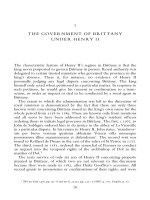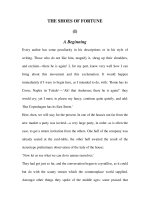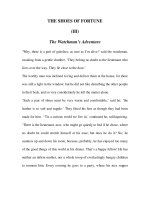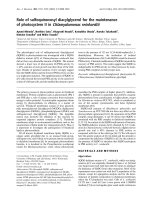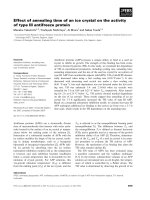THE SHOES OF FORTUNE (II)
Bạn đang xem bản rút gọn của tài liệu. Xem và tải ngay bản đầy đủ của tài liệu tại đây (31.96 KB, 11 trang )
THE SHOES OF FORTUNE
(III)
The Watchman’s Adventure
‘Why, there is a pair of galoshes, as sure as I’m alive!’ said the watchman,
awaking from a gentle slumber. ‘They belong no doubt to the lieutenant who
lives over the way. They lie close to the door.’
The worthy man was inclined to ring and deliver them at the house, for there
was still a light in the window; but he did not like disturbing the other people
in their beds, and so very considerately he left the matter alone.
‘Such a pair of shoes must be very warm and comfortable,’ said he; ‘the
leather is so soft and supple.’ They fitted his feet as though they had been
made for him. ‘‘Tis a curious world we live in,’ continued he, soliloquizing.
‘There is the lieutenant, now, who might go quietly to bed if he chose, where
no doubt he could stretch himself at his ease; but does he do it? No; he
saunters up and down his room, because, probably, he has enjoyed too many
of the good things of this world at his dinner. That’s a happy fellow! He has
neither an infirm mother, nor a whole troop of everlastingly hungry children
to torment him. Every evening he goes to a party, where his nice supper
costs him nothing: would to Heaven I could but change with him! How
happy should I be!’
While expressing his wish, the charm of the shoes, which he had put on,
began to work; the watchman entered into the being and nature of the
lieutenant. He stood in the handsomely furnished apartment, and held
between his fingers a small sheet of rose-colored paper, on which some
verses were written—written indeed by the officer himself; for who has not’,
at least once in his life, had a lyrical moment? And if one then marks down
one’s thoughts, poetry is produced. But here was written:
OH, WERE I RICH!
‘Oh, were I rich! Such was my wish, yea such
When hardly three feet high, I longed for much.
Oh, were I rich! an officer were I, With sword, and uniform, and plume so
high.
And the time came, and officer was I!
But yet I grew not rich. Alas, poor me!
Have pity, Thou, who all man’s wants dost see.
‘I sat one evening sunk in dreams of bliss,
A maid of seven years old gave me a kiss,
I at that time was rich in poesy And tales of old, though poor as poor could
be;
But all she asked for was this poesy.
Then was I rich, but not in gold, poor me!
As Thou dost know, who all men’s hearts canst see.
‘Oh, were I rich! Oft asked I for this boon.
The child grew up to womanhood full soon.
She is so pretty, clever, and so kind Oh, did she know what’s hidden in my
mind
— A tale of old. Would she to me were kind!.
— But I’m condemned to silence! oh, poor me!
— As Thou dost know, who all men’s hearts canst see.
— ‘Oh, were I rich in calm and peace of mind,
— My grief you then would not here written find!
— O thou, to whom I do my heart devote,
— Oh read this page of glad days now remote,
— A dark, dark tale, which I tonight devote!
Dark is the future now.
Alas, poor me! Have pity Thou, who all men’s pains dost see.’
Such verses as these people write when they are in love! But no man in his
senses ever thinks of printing them. Here one of the sorrows of life, in which
there is real poetry, gave itself vent; not that barren grief which the poet may
only hint at, but never depict in its detail—misery and want: that animal
necessity, in short, to snatch at least at a fallen leaf of the bread-fruit tree, if
not at the fruit itself. The higher the position in which one finds oneself
transplanted, the greater is the suffering. Everyday necessity is the stagnant
pool of life—no lovely picture reflects itself therein. Lieutenant, love, and
lack of money—that is a symbolic triangle, or much the same as the half of
the shattered die of Fortune. This the lieutenant felt most poignantly, and
this was the reason he leant his head against the window, and sighed so
deeply.
‘The poor watchman out there in the street is far happier than I. He knows
not what I term privation. He has a home, a wife, and children, who weep
with him over his sorrows, who rejoice with him when he is glad. Oh, far
happier were I, could I exchange with him my being—with his desires and
with his hopes perform the weary pilgrimage of life! Oh, he is a hundred
times happier than I!’
In the same moment the watchman was again watchman. It was the shoes
that caused the metamorphosis by means of which, unknown to himself, he
took upon him the thoughts and feelings of the officer; but, as we have just
seen, he felt himself in his new situation much less contented, and now
preferred the very thing which but some minutes before he had rejected. So
then the watchman was again watchman.
‘That was an unpleasant dream,’ said he; ‘but ‘twas droll enough altogether.
I fancied that I was the lieutenant over there: and yet the thing was not very
much to my taste after all. I missed my good old mother and the dear little
ones; who almost tear me to pieces for sheer love.’
He seated himself once more and nodded: the dream continued to haunt him,
for he still had the shoes on his feet. A falling star shone in the dark
firmament.
‘There falls another star,’ said he: ‘but what does it matter; there are always
enough left. I should not much mind examining the little glimmering things
somewhat nearer, especially the moon; for that would not slip so easily
through a man’s fingers. When we die—so at least says the student, for
whom my wife does the washing— we shall fly about as light as a feather
from one such a star to the other. That’s, of course, not true: but ‘twould be
